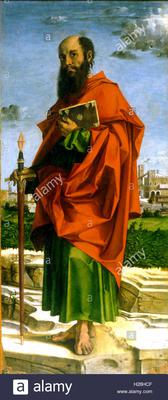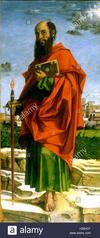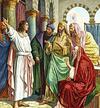Paul's Defense Part 2 of 4
by John Lowe
(Woodruff, S.C.)

“Yet brought up in this city at the feet of Gamaliel, and taught according to the perfect manner of the law of the fathers, and was zealous toward God, as ye all are this day” (3b).
This verse and 26:4 place him in Jerusalem as a young child, though he must have retained some links with Tarsus (9:30; 11:25; Galatians 1:21). He had been educated in Jerusalem at the feet of Gamaliel{5]. His training had consisted of strict instruction in “the law of our fathers” (both the written law and the oral tradition). Paul’s use of this phrase (“the law of our fathers”) now, brings to mind his own former pride as a Pharisees in keeping the law (Philippians 3:6). In Galatians 1:14 he describes himself as once a “zealot” for the traditions; here, with exactly the same meaning, he says that he had been a “zealot” for God (1:13)—as indeed his hearers still were. But note the qualification of Romans 10:2: “For I bear them record that they have a zeal of God, but not according to knowledge.” Zeal needs to be tempered with knowledge.
Paul cleverly disarmed any rising hostility in the minds of the strict Hebraists in the crowd when he told them he was actually reared right there in Jerusalem, and that he was educated by none other than the famous Gamaliel. Thus in his opening remarks, Paul connected himself to both Jewish factions in the crowd. He was Hellenistic, and he was a Hebrew. It was a stroke of genius to introduce the name of Gamaliel, for Gamaliel was the greatest teacher of the day and a disciple of the illustrious and gentle Hillel, one of the leading rabbis of the age. Gamaliel was well-known in Jerusalem as a moderate who favored tolerance, not violence, in dealing with opposing factions in the country. Paul thus identified himself as a trained rabbi, a man schooled in the law and in the rabbinic interpretation of the law. Moreover, he was zealous and, like them, eager to serve the God of the fathers according to the law and according to the traditions and teachings of the Elders. All his remarks showed how his early life was in every respect that of a strict, practicing Jew. Again, this is the very point Paul wanted to underscore with the Jerusalem Jews: far from being a law-breaker, which was the charge they made against him (21:21, 28), Paul’s former life had been marked by a zeal for the law that matched or exceeded their own.
4 And I persecuted this way unto the death, binding and delivering into prisons both men and women.
To the Christians, he gave the impression he was a persecutor of the church—the point is made to show his audience just how zealous he had once been. In his unconverted days, he had hounded the followers of “this Way{4]” to their death (9:2), using the Jewish term for the church, not wishing to irritate these Jews by the introduction of Christian terminology. Some commentators take the phrase “unto the death” as expressing only Paul’s intention, for otherwise, his reference to arresting believers and throwing them into prisons is anticlimactic. But verses 22:20 and 26:10 are sufficient grounds to accept these words at face value. Clearly, the persecution was more extensive than 8:3 and 9:1 and 26:11 would suggest. For the inclusion of women in the program, see 8:3.
Paul was the recognized and authenticated agent of the Sanhedrin to stamp out Christianity. Anyone in the crowd acquainted with the facts know this to be so. If anyone doubted it, all they had to do was ask the high priest or any member of the Sanhedrin.
5 As also the high priest doth bear me witness, and all the estate of the elders: from whom also I received letters unto the brethren, and went to Damascus, to bring them which were there bound unto Jerusalem, for to be punished.
But events at Damascus had changed his life. He had obtained “letters” of introduction to the “brethren” in Damascus (this use of this term stressing his kinship with the Jews) from the “high priest” and all the council. This was not the current high priest (Ananias, 23:2), but probably Caiaphas. Either he was still alive for Paul to make the appeal of this verse (literally, “he is bearing witness”) or the appeal was to the collective memory of the Sanhedrin (or their records) as to what had been done in the past. The Greek of this verse could be construed to mean that he had gone to Damascus to arrest only those Christians who had fled there from Judea and not those already residents in the city. But the point cannot be verified.
Who, in that hostile crowd had been as zealous for the law as he? Who had so thoroughly and rationally demonstrated his zeal for the ancestral faith? Judaism, indeed, had controlled his life. He had been a Hebrew of the Hebrews, zealous to the point of persecuting the church. But something had happened to change and transform his life. Judaism was no longer controlling him. He had found a new motivation.
Verses 6-11. Beginning in verse 6, Paul related his vision of Christ on the Damascus road. This is one of three detailed accounts of Paul’s conversion given in Acts. The first, contained in 9:1-30, is Luke’s third-person narrative of Paul’s experience. The present account and that of 26:4-23 are Paul’s own testimony to the event, delivered in the course of his defense speeches.
6 And it came to pass, that, as I made my journey, and was come nigh unto Damascus about noon, suddenly there shone from heaven a great light round about me.
The second part of his speech is about his conversation. The story, now told in Paul’s words, is essentially the same as in 9:3-19. Where it adds to the earlier narrative, it does so with details that either reflects the personal nature of the recollection or are most likely to appeal to his Jewish audience. Thus he mentions here that it was at noon that he saw the light (26:13). He emphasizes its brightness since it outshone the sun. As a candle, so bright in a darkened room, pales to a feeble yellow flame before the brightness of the noonday sun, so the sun was now dimmed before the burning splendor of a light from heaven. In the New Jerusalem, John tells us, they need “no candle, neither light of the sun; for the Lord God giveth them light” (Revelation 22:5). This was the light that fell all about Saul on the Damascus road. It was a light that swallowed all shadows, that bathed mountain and plain in a sea of splendor, and that blinded him. He was in the presence of a Glory beyond all thought, beyond all power to describe. Only after experiencing such a wonder would he have changed the course of his life.
7 And I fell unto the ground, and heard a voice saying unto me, Saul, Saul, why persecutest thou me?
8 And I answered, Who art thou, Lord? And he said unto me, I am Jesus of Nazareth, whom thou persecutest.
He “fell to the ground” (compare 26:14, where they all fell) and heard the voice, as in 9:4, except that here Jesus is given the title “of Nazareth” (but compare 26:15). This was Paul’s view of the Christ of God. So far as we know, he had never known the meek and lowly Jesus of Nazareth after the flesh. He had certainly not been one of the Lord’s earthly disciples. Paul knew Him only as “Jesus of Nazareth,” and this view colored all his thinking about Jesus. “Jesus of Nazareth” was one of the common titles used by Jewish people to emphasize Jesus’ human origin. Paul’s use of the title here is evidence that the human Jesus is now the resurrected Lord and Messiah. His first glimpse of Him had been a blinding vision of the Lord Jesus Christ, and he carried that vision with him all his life. It pervaded his preaching; lent luster to his letters, and became the driving, motivating force of his life.
“Who art thou, Lord?” he said. “I am Jesus of Nazareth,” replied the Lord. (The title occurs seven times in Acts, beginning with Peter’s sermon in Acts 2:22.) The Lord from heaven described himself to Saul by the very name so despised by the Jews. “Can there any good thing come out of Nazareth?” (John 1:46) they said. Ah, yes, indeed! The Lord of Glory Himself once came from Nazareth. The vision of the ascended Christ, the accompanying realization of his utter foolishness, the futility, guilt, and shame of his life hit Saul “like a ton of bricks.” Then and there, forever and ever, Saul of Tarsus exchanged Judaism for Jesus.
9 And they that were with me saw indeed the light, and were afraid; but they heard not the voice of him that spake to me.
Paul explained that the men who were with him “saw the light, but did not understand the voice of him who was speaking.” As in 9:4 and 7, so it is here in verses 7 and 9; Paul heard intelligible words, but his companions heard only a sound—to them it was not speech.
10 And I said, What shall I do, Lord? And the Lord said unto me, Arise, and go into Damascus; and there it shall be told thee of all things which are appointed for thee to do.
His whole life lay in ruins about him. He had depleted himself in persecuting the infant church and in reviling Jesus, the one he now knew to be the Lord from heaven. “What shall I do, Lord?” was his dispirited cry (it is an addition to the earlier account; 9:5). At once he discovered that the risen Lord had a plan for his life—“. . . go into Damascus; and there it shall be told thee of all things which are appointed for thee to do. The full scope of that plan was not revealed right away, but the next step was made clear. He must “go into Damascus” and await further enlightenment.
No content on preachology.com may be printed or
copied to any other site without permission.
|
The Preaching Ezine Subscribe to my free newsletter for monthly sermons and get a free book right now. Just follow the link above and get the details! |
|
Sermon Supply Ministry
Be ready for Sunday…before Saturday night! |
|
Manna Seminary
Did you ever want to start or finish your Ministry Training? |
|
YOUR PAGES: by sharing YOUR great sermons! by sharing YOUR great poems! |






